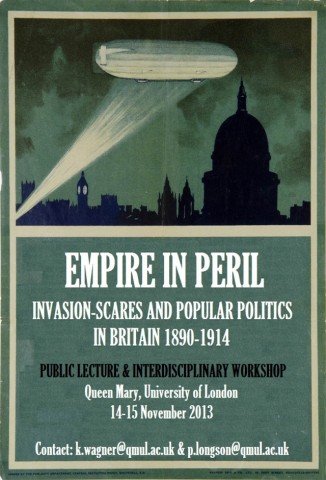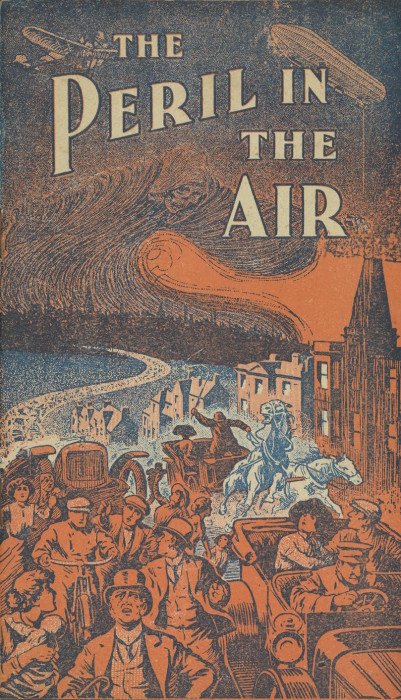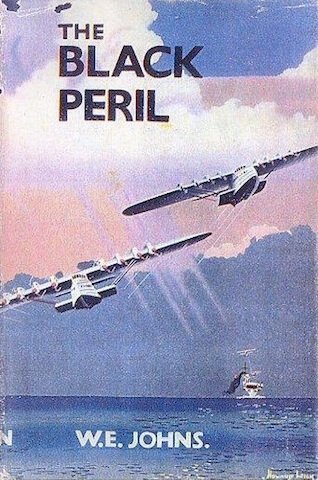Is this the best conference topic ever? I think it just might be. There's even a Zeppelin on the poster!
Note that abstracts are due by 1 August 2013.
EMPIRE IN PERIL:
INVASION-SCARES AND POPULAR POLITICS IN BRITAIN 1890-1914Public Lecture & Interdisciplinary Workshop
Queen Mary, University of London, 14-15 November 2013Speakers:
Bernard Porter (Newcastle (em), UK) • Nicholas Hiley (Kent, UK) • Michael Matin (Warren-Wilson, US) • Jan Rueger (Birkbeck, UK) • Matthew Seligmann (Brunel, UK)This year marks the first centenary of one of the most popular examples of the invasion-scare genre: Saki’s (H.H. Munro) When William Came (1913). Saki’s famous account imagines the defeat of Britain at the hand of an invading German army. The cultural and political concerns of Edwardian Britain lay at the heart of the novel’s masochistic narrative: degeneration, the rise of modernity, militarism, national security, decadence, germanophobia, a battle for global hegemony, and imperial decline. As such, the narrative reflects the general convergence of popular politics, the public and the press, which coalesced around a repertoire of anxieties, embodied in the trope of the ‘German Menace’ and foreign intrigues in the metropole and in the empire.
The aim of this workshop is to facilitate a greater integration of the study of invasion-scares and popular politics at the intersection of divergent approaches. It is suggested that a more thorough investigation of the interconnectedness of press, politics and popular culture is essential to furthering our understanding of key aspects of Edwardian society and British identity on the eve of the Great War. Responding to a recent surge of interest in the pre-war period, this workshop will stimulate debate and reflection on the latest research in these areas, and identify avenues for further study, based upon a broader and more inclusive approach to historical analysis.
KEY THEMES:
INVASION-SCARE LITERATURE • SPY-FEVER • ARMAMENT RACE • ANGLO-GERMAN RIVALRY • POLITICS OF THE PRESS • IMAGINING FUTURE WARS • PANIC AND ANXIETIES • POPULAR POLITICS • FOREIGN INTRIGUES AT HOME AND IN THE EMPIRE
Contributions from established scholars as well as junior researchers in all fields relevant to the broader subject are invited. Participants should submit a 300-word abstract of their proposed paper and a brief biography by 1 August 2013.
Contacts:
Kim A. Wagner (k.wagner@qmul.ac.uk) & Patrick Longson (p.longson@qmul.ac.uk)
Dr Kim Wagner
Queen Mary, University of London
Department of History
Mile End Road
London E1 4NSTel no: +44(0)207 882 8428
Email: k.wagner@qmul.ac.uk
Visit the website at http://invasionscares.wordpress.com
Image source: Island Mentalities.
![]() This work is licensed under a Creative Commons Attribution-NonCommercial-NoDerivatives 4.0 International License.
Permissions beyond the scope of this license may be available at http://airminded.org/copyright/.
This work is licensed under a Creative Commons Attribution-NonCommercial-NoDerivatives 4.0 International License.
Permissions beyond the scope of this license may be available at http://airminded.org/copyright/.





Erik Lund
It's weird that when I read "When William Came," my attention was drawn, not to all the big themes that Saki evidently wanted to deal with, but to the proprietary armour he introduces in a single line that allows the Germans to beat the RN.
Later, I was introduced to Barnett's nonsense about actual German armour at Jutland, and still later to the context of his laughable footnote: John Jellicoe's testimony in a 1909 parliamentary inquiry into new methods of steel making, where Jellicoe really is concerned that Germany's lead in electrical steel making is opening up a technological risk.
I can't parse Jellicoe's motives, but I'm pretty sure that Saki doesn't care about his science fiction contrivance. It gets him to the themes that he does care about, and that's that. But the thing is, he's not in charge of his readers, and what we choose to get out of it might well be a concern with new methods of making steel.
Which, in the end, is the one thing of lasting importance to come out of this! Industrial history is clearly not as interesting as literary, yet while Saki lost his bid to be considered as a serious writer, electric steel had all sorts of consequences. If I had to pitch a big picture story, I would say that British electrical generation to provide for electric steel helped pave the way to the National Grid, national electrification, and all of the nationalisation schemes of the 1950s. But, really, harder crankshaft bearing surfaces, hence more powerful automobile engines, will do as well.
This is something that I've said in connection with zeppelin scares: it's interesting that the moral panics that Brett unearths lead (or are led?) in the direction of productive investments by the security state. who is leading? The public? The press? The security apparatus? Or is this a hysteresis of panic?
Brett Holman
Post authorAbstracts should be sent to the organisers, Erik! :)
I see it as inherent in the structure of this particular subset of moral panics, which I call defence panics, an emergent property. In moral panics you get various experts (sometimes self-appointed) offering their solutions (usually preconceived) to the crisis. Because defence panics, by definition, involve the defence of the realm, the solutions on offer usually (not always) call upon the state to do something. And this in turn usually means some expansion of the state (build more airships/AA guns/deep shelters/etc). Of course governments and particular elements thereof can use these demands as cover to do what they wanted anyway.
Pingback:
Airminded world tour 2013-14